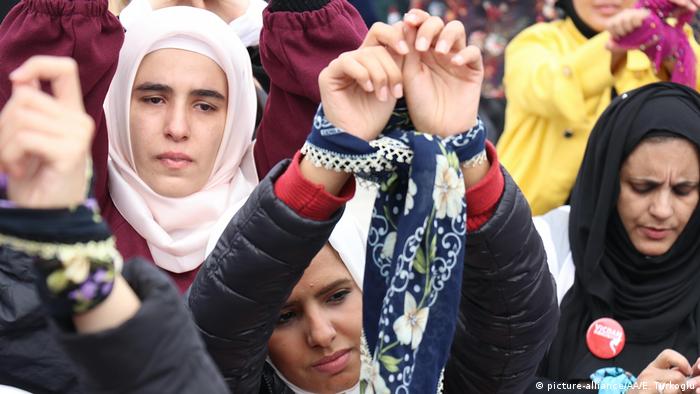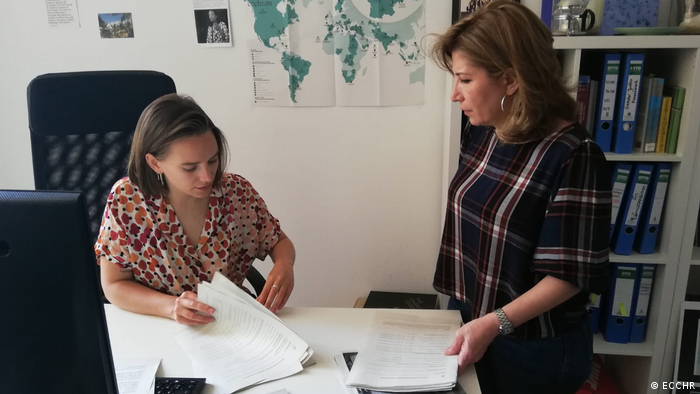
'For most women, the horror starts at the moment of arrest. First, the male soldiers touch them inappropriately. On arrival at the prison, they are forced to strip naked. The invasion of their bodies often begins with an aggressive, intimate search by a male guard.
For thousands of female detainees in régime prisons this marks the start of a journey to hell — one that very often ends with them being broken and then ostracized from their families and communities.
Sexual, gender-based violence is one of the most widespread crimes in Syria's government detention facilities, according to international law expert, Alexandra Lily Kather. Yet, it is also one of the most underreported.
"We know about air strikes, we know about weapons, we know about torture, we know about [the Islamic State]," says Kather who works for the European Center for Constitutional and Human Rights in Berlin.
"But what is not being covered sufficiently either in the media, or in terms of calling perpetrators to account, is sexual violence [in régime prisons], despite the devastation it causes both for the victim and for society as whole."
On Tuesday Kather and her colleagues at the ECCHR took a step they hope will change this state-of-affairs in a radical way.
Together with Syrian rights activist, Joumana Seif, Kather filed a criminal complaint with Germany's federal prosecutor calling for sexual and gender-based violence in Syria to be prosecuted as a crime against humanity.
Germany has already achieved a world first by putting two former Syrian intelligence officers on trial in the town of Koblenz for war crimes under the principle of universal jurisdiction, which allows countries to try foreign nationals for crimes committed abroad.
However, while applauding this effort, ECCHR says Germany has failed to include sexual violence as a crime against humanity on any indictments or arrest warrants, which in their view is a grave oversight and a blow to the victims.
"From the evidence we have," says Kather, "we can clearly see that sexual violence was part of a systematic and widespread attack on the civilian population and therefore should be categorized as a crime against humanity."
The UN Human Rights Council shares this opinion. In a harrowing report published in 2018, the body detailed abuses based on the testimony of nearly 500 survivors and witnesses. Of all the warring parties, pro-government forces and militias were the most prolific offenders when it came to sexual attacks and rapes. The UN concluded they used sexual violence as a weapon to instill fear and inflict humiliation.
The report's section on detention centers outlines acts of astonishing cruelty with a girl as young as nine being raped by a Syrian guard. Others were also sexually tortured and threatened with rape or raped in front of other guards and detainees. One brigadier general told a low-ranking officer who showed an interest in a female inmate: "Take her. Do anything you want with her."
Men and boys were also raped and sexually violated in detention, but according to the report women and girls were disproportionately targeted.
The need to seek redress for such atrocities is at the heart of the case being pursued by the ECCHR. They are acting on behalf of seven survivors, including four Syrian women and three men now based in Europe. All were civilians incarcerated in prisons operated by Syria's Air Force Intelligence Service in Aleppo, Hama and Damascus. ECCHR say they have identified nine perpetrators based on the testimony of these victims and other sources of evidence.
As part of their criminal complaint, the international lawyers at ECCHR have issued a demand to Germany's Federal Prosecutor for an existing arrest warrant for the former head of Syrian Air Force Intelligence Service, Jamil Hassan, to be amended to include sexual violence as a crime against humanity. Additionally, they have called for investigations, also focusing on crimes of a sexual nature to be opened into the other eight alleged perpetrators and arrest warrants to be issued.
Rights activist and legal expert Joumana Seif underlined the importance of characterizing crimes as "sexual" as opposed to other forms of brutality, especially in Syria.
"Most of the survivors are women and when they are released, despite having such dreadful experiences in prison they are discriminated against. They pay twice," says Seif.
"What they need are special health services and psychological help and the right to be protected. They need recognition."
Men subjected to sexual violence in prison often feel their masculinity has been compromised and fear losing the respect of their peers, according to fellow legal expert Kather. Yet for women the consequences can be doubly devastating.
"If a woman has been sexually violated, she is judged to have brought shame on the honor of the family and will be excluded," says Kather. "This destabilizes the family and if you destabilize family after family, you end up destabilizing the core of society."
Justice for victims of sexual and gender-based crimes is also seen as key to any future reconciliation efforts, especially given what the UN report called a "near-total absence of accountability for such violations."
For now, though, lawyer Kather, is focusing on the present.
"This is a régime, a state that uses people's bodies for their political aim to oppress and terrorize, she says. "And we demand accountability from the German prosecutor." '

No comments:
Post a Comment